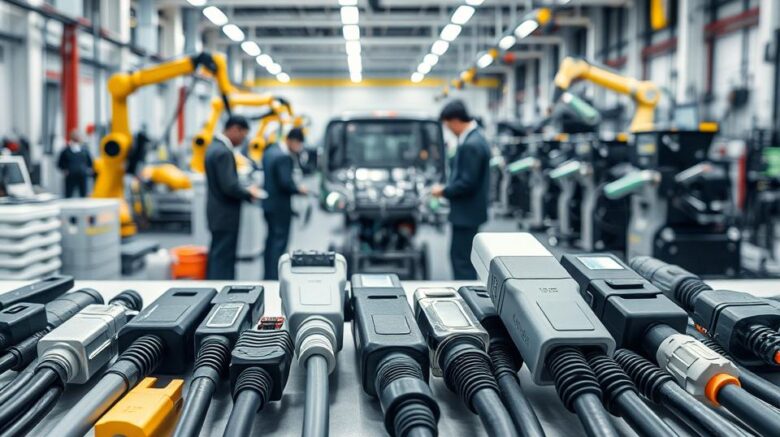Best EV Charging Cable Manufacturers for Your Electric Vehicle
The EV market is expanding rapidly, with the demand for trustworthy and high-performance charging solutions increasing sharply. As of now, industry leaders have been at the vanguard of this change, providing high-quality charging infrastructure. Southwire, for instance, entered the market in 2014 and excels, boasting over 1000 five-star reviews and a 75-year legacy in electrical construction.
The surge in electric vehicle adoption creates a requirement for durable, fast, and safe EV Charger Manufacturers. Top manufacturers are pioneering to meet these evolving needs, offering products that enhance the overall charging experience.
Understanding the distinctions between various charging solutions is essential for choosing correctly. High-grade charging infrastructure directly impacts vehicle performance and user experience.
Major Highlights
- Leading brands provide premium cables that boost durability and security.
- Growing EV adoption fuels demand for fast, reliable infrastructure.
- Top brands pioneer solutions for changing EV requirements.
- Premium cables enhance both charge rate and vehicle function.
- Buying premium chargers pays off over time.

The Critical Role of Premium EV Charging Cables
As more drivers choose EVs, the value of top-grade EV charging cables is immense. The performance, safety, and reliability of electric vehicle charging systems rest on the quality of the charging cables used.
The Evolution of Electric Vehicle Charging Technology
Electric vehicle charging technology has undergone significant advancements in recent years, with a focus on speedy charge times and enhanced protections. Today’s EV charging cables are designed to meet these evolving needs, incorporating high-grade materials and advanced designs to minimize power loss and maximize charging efficiency.
The Case for Premium Charging Infrastructure
Quality charging cables directly impact the overall performance and safety of EV charging infrastructure. Durable features, such as weather resistance and temperature tolerance, maintain performance in harsh conditions. Moreover, meeting standards and adherence to industry guidelines are essential in guaranteeing safe operation.
| Key Features | Benefits |
|---|---|
| Superior materials and construction | Minimized power loss during energy transfer |
| Robust durability | Weather resistance, flexibility in extreme temperatures |
| Regulatory compliance | Rigorous safety requirements met |
| Maintainability | Long-term value proposition, reduced waste |
Our high-performance cable solutions, such as those offered by Aichie Tech Electronics, are tested for quality and compliance in The Cable Lab. By opting for serviceable Portable EV Charger, repairable designs reduce lifetime costs, lowering environmental impact.
Premier Chinese EV Cable Suppliers
China is home to a growing number of EV charging cable manufacturers. These companies are crucial in supporting the expanding electric vehicle (EV) market, providing high-quality automotive cables designed for various charging needs.
Wottz – Pioneers in EV Cables Since 2014
Wottz has established itself as a prominent player in the EV charging cable market since 2014. They offer a range of cables that cover Mode 1–4 charging standards, including Mode 1, 2, 3, and DC Fast Charging (Mode 4).
Aichie Tech Electronics: 75+ Years of Electrical Expertise
Aichie Tech Electronics’ seven-decade legacy informs its premium cable designs. Their products are built for residential and commercial applications.
More Leading EV Cable Brands
Beyond industry leaders like Wottz and Southwire, other manufacturers are making their mark by focusing on specific automotive applications or technological innovations in electric vehicle charging. These include Type 1 & 2 connector experts, as well as companies developing cables with enhanced flexibility and resistance to environmental factors.
Types of EV Charging Cables Explained
As electric vehicles become increasingly popular, understanding the various types of EV Charging Cable Manufacturers is crucial for optimal charging experiences. Knowing cable types ensures you pick the right charger. The diversity in EV charging infrastructure necessitates a closer look at the cable options.
Type1 vs. Type2 Charging Cables
SAE J1772 (Type 1) and Mennekes (Type 2) are the main global standards. Type 1, also known as SAE J1772, is predominantly used in North America, while Type 2, or Mennekes, is the standard in Europe. The choice between these cables depends on the vehicle’s connector type and the charging station’s compatibility. Type 2 cables often handle greater power, making them ideal for speed.
Level2 and DC Fast Charging Solutions
Level 2 AC cables charge faster, up to 19.2 kW. DC Fast Charging cables, on the other hand, provide rapid charging by converting AC power to DC within the charging station, delivering rapid fill-ups. These cables are essential for long-distance EV travel, letting EVs charge in minutes.
Granny Chargers vs Tethered Units
Portable EV charging cables, such as “Granny chargers,” offer flexibility by allowing owners to charge their vehicles from standard household outlets. Tethered cables are fixed to charging stations, offering ease at the cost of portability. The choice depends on the owner’s charging needs and preferences.
Cable length, power rating, and connector type matter most. For instance, portable charging cables range from basic Level1 emergency chargers to more robust Level2 solutions. Vehicle-to-load (V2L) cables represent an emerging category, enabling EVs to power external devices.
- Flexible granny chargers and L2 units suit various needs.
- Tethered cables are permanently attached to charging stations, limiting flexibility but eliminating the need for personal cables.
- Cable length is a critical consideration, with options ranging from 5-meter standard cables to 50-meter extended cables.
Key Features of High-Quality EV Charging Cables
High-quality EV charging cables are distinguished by several key features that ensure reliable and safe charging. These features are crucial for maintaining the integrity of the charging process and safeguarding the vehicle and user.
Durability and Weather Resistance
Durability and weather resistance are paramount in EV charging cables. Manufacturers like Wottz and Southwire use RoHS-compliant recyclable compounds, ensuring they perform in harsh climates. Their repairable builds support longevity and eco-reuse.
Flexibility and Ease of Use
Cables need to flex yet remain tough. High-quality EV charging cables are built for easy handling without sacrificing strength. This flexibility is combined with rugged construction for lasting performance.
Safety Certifications and Compliance Standards
Approved safety marks ensure reliable performance. They ensure their products meet or exceed standards such as IEC62196 for connectors and UL2594 in North America. Independent labs verify safety, toughness, and weatherproofing.
| Certification | Description | Region |
|---|---|---|
| IEC62196 | Connector safety standards | International |
| UL2594 | Standard for electric vehicle supply equipment | North America |
| ROHS | Restriction of hazardous substances | International |
Emphasizing these attributes yields cables that are safe, durable, and user-friendly.
Cutting-Edge EV Cable Innovations
New cable tech is transforming EV charging, with a focus on speed, improved signal integrity, and sustainable compounds.
Liquid-Cooled Charging Cables for Ultra-Fast Charging
Cooling fluids enable higher charge rates, enabling electric vehicles to charge at significantly higher speeds without overheating.
Advanced Connector Tech
Hyperboloid contacts are being integrated into EV charging cables to enhance signal integrity, ensuring reliable and efficient data transfer during the charging process.
Green Charging Cable Designs
Companies focus on green materials, using recyclable materials and eco-friendly compounds that reduce environmental impact. For instance, companies like Aichie Tech Electronics and Wottz are embracing repairable designs and strict standards to foster reuse.
Programs for cable recycling, non-toxic compounds, and TPU sheaths mark the eco shift.
Buyer’s Guide to EV Charging Cables
Choosing the right EV charging cable is crucial for efficient and safe charging. To make an informed decision, consider several key factors.
Connector Compatibility
Verify your car’s inlet and cable plug match. Your vehicle’s onboard charger capacity sets the upper limit for AC power.
Determining the Optimal Cable Length
Choose a cable length that suits your charging needs. A longer cable provides more flexibility but may be heavier and less manageable.
Matching Power and Speed
Match your cable’s power handling to your vehicle’s capabilities. Standard Level 2 home charging operates at 7.2 kW, but some vehicles support up to 19.2 kW with appropriate electrical service.
By considering these factors, you can select an EV charging cable that meets your needs and enhances your overall charging experience.
Final Thoughts on Premium EV Cables
With EV growth unabated, premium cables are essential. Choosing cables from Wottz or Aichie Tech Electronics provides long-term value and reliability. Their serviceable designs enable repairs over replacements to cut waste. This approach aligns with the core values of electric vehicle ownership by promoting sustainability.
Premium cables offer certification, future proofing, and reliability.
